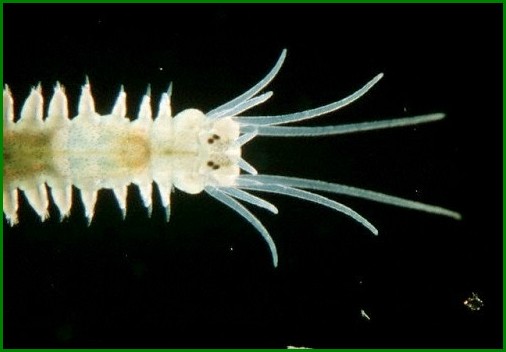Every biological clock runs by its own rules Almost all living organisms, from bacteria to mammals, there is a biological clock, clock biochemistry, physiology and behavior with a daily change of day and night. But do not be too difficult to notice that many species still living and others nesutochnym hours, watching the tides, or, for example, the changing seasons. You can, of course, assume that the tidal or seasonal hours are controlled by the same mechanism as the usual daily.
However, until now, scientists did not know if this is the same or different kinds of cyclic activity have their own clock.

Eurydice pulchra (photo bathyporeia).
Clarity on this issue has made a couple of marine arthropods ... rather, two groups of scientists who are researchers and their independently came to the same conclusions regarding the presence of organisms at different hours for different uses.
Karalambos Kyriacou of the University of Leicester (UK) and his colleagues studied the behavior of Eurydice pulchra, small (less than 1 cm in length) copepod that swim and feed in the coastal waters during high tide and low-tide hiding in the sand. That is, the activity of E. pulchra is subject to tidal cycle with a period of 12.4 hours Also, the shell of the crustacean cover dark spots, which serve as a kind of protection from the sun and the pattern of which varies during the day and at night. For daily - not a tidal - activity are some of the features and behavior of E. pulchra: if the tide in the afternoon, crustaceans swim quicker and smarter than during the night tide.
The researchers kept crustaceans month in the dark to Unsync cycles of day and night and the frequency of the behavior and pattern of spots in E. pulchra. And that crustaceans feel ebb and flow, the vessel in which they lived, vibrated for 10 minutes every 12.4 hours. In the journal Current Biologyavtory write that when frustrated hours daily tidal clock in E. pulchra worked fine.
Moreover, when the genes are turned off in specimens of circadian rhythm on their tidal clock is not affected.
Another research group led by Christine Tessmar-Rayble of the University of Vienna (Austria) worked with Nereid worm Platynereis dumerilii (which, in particular, is known for the fact that he has photoreceptors that are independent of the eye, but similar to human photoreceptors). Some features of the behavior of P. dumerilii subject to the lunar cycle of spawning, for example, occurs in these worms in the new moon.

Platynereis dumerilii (photo Douglas P. Wilson).
Researchers have displaced lunar rhythm worms, different lighting them at night, and it influenced the behavior of the animals during the day and at night. However P. dumerilii moon is not only, but also normal circadian rhythm, and, as in the case E. pulchra, the breach did not affect the lunar changes in the behavior of worms. That is, the lunar rhythm disrupted the daily, but not vice versa.
The results of experiments, the researchers published in Cell Reports.
Chronobiology March Murrow University of Munich Ludwig - Maximilians (Germany) hopes that this work will help scientists cease to dwell exclusively on the daily rhythms of trying to explain to them using all cyclic changes that occur in living organisms.
If marine crustaceans for a lunar tidal cycle and have their own biological clock, it's probably worth looking at the clock and individual rights - say, for the menstrual cycle. In addition, according to some reports, even a dream which is believed to be subject to circadian rhythms are strongly influenced by the lunar cycle, which may also speaks about the mutual influence on each other similar, yet different biological clock mechanisms.
Global output - every biological clock runs by its own rules. The principle of individuality, uniqueness extends to all, the biological clock is not an exception.
in the wake of the University of Leicester, ScienceNOW, Shutterstock, compulenta.computerra.ru
Analysis of the Biological Clock Decision
Women seeking to balance career, social life and family life in making the decision on when to have a child may benefit from applying formal decision-making science to this complex emotional choice.